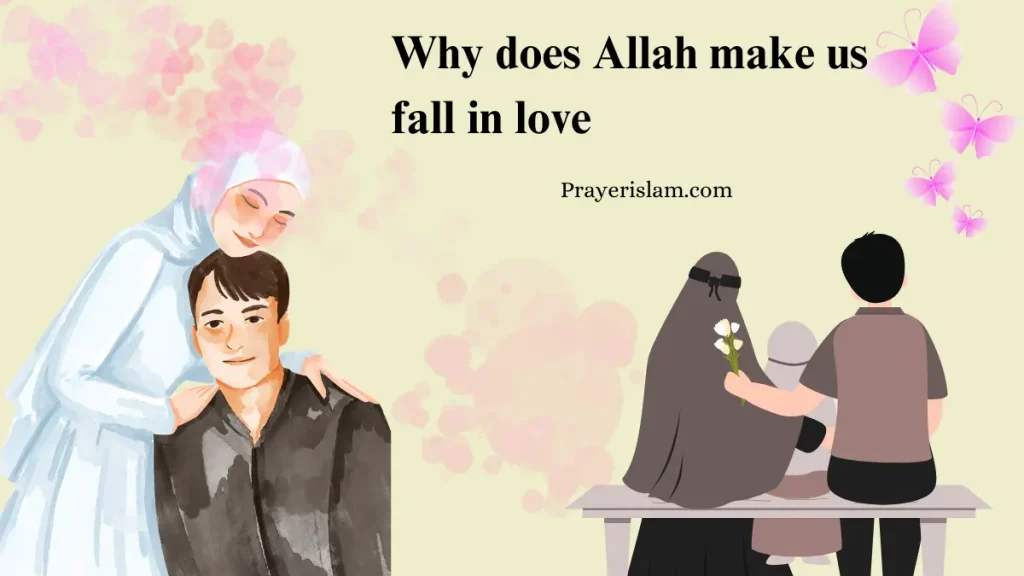Love is one of the most profound and powerful emotions that humans experience. It can inspire us to be our best selves, bring immense joy, and at times, cause deep heartache. From an Islamic perspective, love is a complex and multifaceted emotion that plays a significant role in our spiritual and worldly lives. But why does Allah make us fall in love? What is the purpose behind this powerful emotion? In this blog post, we will explore the divine wisdom behind love, how it fits into our faith, and what we can learn from it.
1. The Divine Origin of Love
In Islam, love is considered a blessing from Allah. The Quran and Hadiths frequently speak of love as a central aspect of human existence. Allah created love as a means to connect with one another, to build families, and to experience a taste of the compassion and mercy that He has for all His creations. The ability to love and be loved is a sign of Allah’s mercy and an integral part of human nature.
2. Love as a Test of Faith
Falling in love can also be a test of faith. How we manage our emotions, maintain our Islamic principles, and treat others in the process reveals a great deal about our character and devotion to Allah. Love can be a test of patience, self-control, and trust in Allah’s plan. It challenges us to balance our desires with our faith, making sure that our love aligns with Islamic teachings.
3. The Role of Love in Building Families
One of the primary purposes of love in Islam is to establish and nurture families. Love between spouses is the foundation of a strong, healthy family unit. The Quran emphasizes the importance of love and mercy between husband and wife, stating that Allah has placed love and compassion between them as a sign for those who reflect. Through love, families grow, and the next generation is nurtured in a loving and Islamic environment.
4. Love as a Reflection of Divine Love
Human love is often seen as a reflection of Allah’s infinite love for His creation. The love that we experience in this world gives us a glimpse into the greater love that Allah has for us. By understanding and experiencing love, we can better appreciate the mercy, compassion, and care that Allah extends to all His creation. It is through love that we can connect more deeply with Allah and understand His attributes.
5. The Spiritual Dimension of Love
Love is not just an emotion but also has a significant spiritual dimension in Islam. Falling in love can lead to personal and spiritual growth. It can inspire acts of kindness, generosity, and selflessness. When love is directed toward the right person and nurtured in accordance with Islamic principles, it can bring a person closer to Allah. Love that is rooted in faith and guided by Islamic values can be a means of attaining spiritual fulfillment.
6. Love and Responsibility in Islam
With love comes responsibility. In Islam, love is not just about fulfilling one’s desires but also about fulfilling one’s duties toward the person they love. This includes respecting their rights, caring for their well-being, and maintaining the boundaries set by Islam. Love in Islam is not just an emotion; it is a commitment to live by the principles of justice, mercy, and compassion in all interactions.
7. The Role of Love in Strengthening Communities
Love extends beyond romantic relationships. In Islam, the love between friends, family members, and fellow Muslims is also highly valued. This love helps to strengthen communities and build bonds of brotherhood and sisterhood. By fostering love and compassion within the community, Muslims can create a supportive and caring environment that reflects the teachings of Islam.
8. Dealing with Unrequited Love in Islam
Unrequited love is a common human experience, and Islam provides guidance on how to handle it with grace and patience. When love is not reciprocated, it can be a test from Allah. Islam encourages believers to turn to Allah in times of difficulty, to seek His guidance and comfort, and to trust in His plan. By maintaining faith and focusing on personal and spiritual growth, one can overcome the challenges of unrequited love.
9. Love and Marriage in Islam
Marriage is the natural culmination of love in Islam. The Prophet Muhammad (PBUH) emphasized the importance of marriage and the role of love within it. Marriage in Islam is not just a contract but a spiritual bond that is based on love, mercy, and mutual respect. Through marriage, love is given a lawful and blessed outlet, allowing both partners to grow together in faith and love.
10. Understanding Love’s Challenges and Blessings
Love is both a challenge and a blessing in Islam. It can bring immense joy and fulfillment but also requires effort, patience, and commitment. Understanding the divine wisdom behind love helps Muslims navigate the complexities of relationships while maintaining their faith. By approaching love with the right intentions and in accordance with Islamic principles, one can experience the true blessings that love has to offer.
FAQs: Why Does Allah Make Us Fall in Love?
1. Why does Allah allow us to fall in love?
Allah allows us to fall in love as a means of connecting with others, building families, and reflecting His love for creation. Love is a blessing and a test that can lead to personal and spiritual growth when approached with the right intentions.
2. Is falling in love a test from Allah?
Yes, falling in love can be a test from Allah. It tests your patience, self-control, and ability to maintain Islamic principles. It’s an opportunity to demonstrate your faith and trust in Allah’s plan.
3. How should love be expressed in Islam?
Love in Islam should be expressed through actions that align with Islamic teachings. This includes showing respect, kindness, and compassion, fulfilling responsibilities, and maintaining the boundaries set by Islam.
4. Can love bring me closer to Allah?
Yes, when nurtured in accordance with Islamic principles, love can bring you closer to Allah. It can inspire you to act with kindness and selflessness and strengthen your faith through the challenges and blessings it brings.
5. What if I love someone who doesn’t love me back?
Unrequited love can be a difficult test. Islam encourages you to seek comfort and guidance from Allah, focus on personal growth, and trust in Allah’s plan. Unrequited love may be a sign that Allah has something better planned for you.
6. Is it wrong to love someone before marriage?
In Islam, love before marriage is permissible as long as it is kept within the boundaries of Islamic teachings. It’s important to maintain modesty, avoid physical interactions, and pursue marriage if the relationship is serious.
7. How can I ensure my love is halal?
To ensure your love is halal, follow Islamic guidelines on interactions between the sexes. Keep your intentions pure, avoid inappropriate behavior, and seek marriage as a means to legitimize the relationship.
8. Can love be a reason to get married in Islam?
Yes, love is a valid reason to get married in Islam. However, it’s important that the love is based on mutual respect, shared values, and a commitment to fulfilling each other’s rights and responsibilities within marriage.
9. What is the role of love in marriage?
Love plays a central role in marriage in Islam. It is the foundation of a strong and healthy relationship, providing emotional and spiritual support, fostering mutual respect, and strengthening the bond between spouses.
10. How does love contribute to community building in Islam?
Love helps build strong communities by fostering bonds of brotherhood and sisterhood. It encourages mutual support, compassion, and cooperation among community members, creating a caring and cohesive environment.
Conclusion
Love is a profound and powerful emotion that plays a significant role in the life of a Muslim. It is a blessing from Allah, a means of connecting with others, and a test of faith. By understanding the divine wisdom behind love, Muslims can navigate their relationships with faith, patience, and trust in Allah’s plan. Whether in the context of family, marriage, or community, love is an essential part of the Islamic experience, bringing both challenges and immense blessings.







